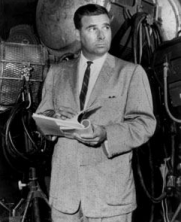Celebrating Gene Roddenberry's Legacy on his 90th Birthday
 Today marks what would have been Gene Roddenberry's 90th birthday. Best-known as the creator and executive producer of Star Trek, Roddenberry was born in El Paso, Texas on August 19, 1921 and grew up in Los Angeles. He became a Los Angeles police officer, but quickly transitioned to TV as a technical advisor to Frederick Ziv on Mr. District Attorney (1954) and later became a headwriter for Ziv on The West Point Story (CBS, 1956-57 and ABC, 1957-58). He eventually created his first original series The Lieutenant (NBC, 1963-64) which examined social questions of the day in a military setting. Coincidentally, the show featured guest performances by actors who later played a large role in Star Trek: Nichelle Nichols, Leonard Nimoy, and Majel Barrett (who later became his wife). He first pitched Star Trek in 1964, and finally found support from Desilu Studios. The series premiered on September 8, 1966 and has been part of American pop culture ever since.
Today marks what would have been Gene Roddenberry's 90th birthday. Best-known as the creator and executive producer of Star Trek, Roddenberry was born in El Paso, Texas on August 19, 1921 and grew up in Los Angeles. He became a Los Angeles police officer, but quickly transitioned to TV as a technical advisor to Frederick Ziv on Mr. District Attorney (1954) and later became a headwriter for Ziv on The West Point Story (CBS, 1956-57 and ABC, 1957-58). He eventually created his first original series The Lieutenant (NBC, 1963-64) which examined social questions of the day in a military setting. Coincidentally, the show featured guest performances by actors who later played a large role in Star Trek: Nichelle Nichols, Leonard Nimoy, and Majel Barrett (who later became his wife). He first pitched Star Trek in 1964, and finally found support from Desilu Studios. The series premiered on September 8, 1966 and has been part of American pop culture ever since.
Although Roddenberry passed away in 1991, before the Archive was established, many of his colleagues spoke about him in their own interviews. Here are some excerpts:
Robert Justman (Producer)
Working with Gene Roddenberry, very often it was a lot of fun. He had great intellect. This was someone who came from a very poor background and made himself what he was. He was driven, but he had an enormously pleasing personality. Everyone liked him, and yet they knew he was the boss. Which he was. His door was, was usually open to me, it was always open to me in the beginning. But then eventually, because he was rewriting himself, and in those days, it was slow going, he had a buzzer placed in the rug, so that I couldn’t walk in on him, and the door would remain closed. One afternoon while the secretary went to lunch, I took a look around and discovered the button that she pushes to do the buzzer to open the door. I then pressed the buzzer and waltzed into Gene’s office which was a very, very long office, it was made out of two offices and it was quite long and it had the door where you came in, in the front, and there was an escape hatch in the rear where you could exit onto the studio street. I entered the room when I wasn’t supposed to, and Gene was writing away with a No. 2 pencil on some legal pad in haste to correct everything. I walked in and I walked past him not really looking at him, and I walked to the end of the room, opened the escape hatch and left. [he laughs] Just to show him that he couldn’t shut me out!
Dorothy C. (DC) Fontana (Writer)
Star Trek lives. I don’t know why people keep coming back to it, but I have had so many people, whether they’re in my business, or whether they are outside, civilians if you will, coming in to say, "you know, Star Trek still talks to me. But I like the original series." They always come back to the original series. That’s the one that Gene was the most hand- on with. He had hands on it for the first two seasons of Star Trek, which are the episodes that people remember most. I just think that we were talking to an audience that was listening. We weren’t just there for eye-candy. We were there to entertain, but we weren’t just there to entertain. We were trying to talk to them. We were trying to tell intelligent stories with good actors and good messages and I think we succeeded. The goal on any show is to tell the best stories you can. I think we succeeded admirably, especially in the first two seasons of Star Trek.
George Takei (Actor) reminisces about working with Roddenberry and his vision for the series in this video clip:
For more "Star Trek" stories, visit www.emmytvlegends.org/star-trek-stories
